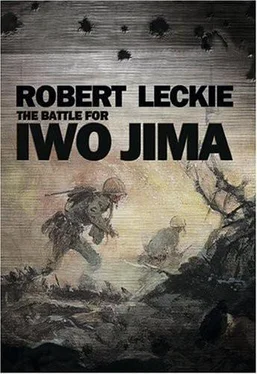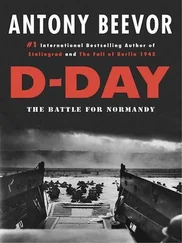There was no banzai charge that night, though. Instead General Kuribayashi with about 400 men came out of hiding—probably from under the blockhouse—and moved to a cave closer to the water. Evidently the general had decided to take a few more Americans with him before going out in a blaze of glory.
Next day the Marines returned to the blockhouse. Tankdozers had now caught up to the riflemen moving through the gorge. Grinding slowly forward while bullets clanged against their steel-plated hides, the tankdozers pushed dirt and rubble over the blockhouse’s air vents and sealed them off. The Marine engineers arrived with five enormous charges of dynamite, each weighing 1,600 pounds. Five times Iwo Jima was rocked by great explosions, and with that the blockhouse finally caved in.
The tankdozers and their covering riflemen rolled on. The Gorge was shrinking steadily. It became an area of about 100 square yards, then 80, then 60…. Tankdozers were butting out paths for the Sherman tanks that followed. With their 75-millimeter guns, the Shermans could fire point-blank into the last few cave mouths.
Suddenly, out of one of the caves, came a Japanese soldier. He ran at the tankdozer with a satchel charge. The Marine driver swung his clumsy vehicle around to confront the enemy. Raising his bulldozer blade high in the air, he dropped it, and cut his assailant in two. With that, the driver climbed out of his tankdozer and ran back to the waiting Shermans. Heedless of bullets spanging around him, he hammered on the side of one until the commander opened his turret.
“Did you see what that crazy Nip tried to do to me?” the excited driver yelled. “That does it, brother—I’ve had it!”
He turned and walked out of the gorge.
But he and his comrades were back the following day, March 21, and on that night General Kuribayashi sent a message to the neighboring garrison on the island of Chichi Jima: “We have not eaten nor drunk for five days. But our fighting spirit is still running high. We are going to fight bravely to the last.” Three days later, there came another message: “All officers and men of Chichi Jima—good-by.”
Those were General Kuribayashi’s last words, if indeed they did come from him. No one knows. Nor does anyone know what happened to the Japanese commander. On March 25, the Gorge was down to a square of 50 yards, and on that day a Marine combat patrol traversed it without harm. The end, it seemed, had come.
But in the early-morning darkness of March 26, some 300 shadowy figures clambered from the caves and caverns and holes of the Gorge pocket. Many of them carried sabers, and there were numerous officers among them. Tadamichi Kuribayashi probably was there, perhaps seeing to it that the men who carried explosives knew where they were to go on this final suicide charge. The chief target was the Army Air Corps’ VII Fighter Command on the west coast near Airfield Number Two.
There the suiciders came upon troops untrained for fighting on foot. They struck with a howl, throwing grenades, stabbing sleeping airmen, and blasting away with captured American weapons. Then the Japanese overran a battalion of Marine construction troops. There, too, the fighting was confused and bloody, until First Lieutenant Harry Martin rallied the Marines and stopped the enemy short of a hastily organized defense line. Then he broke the Japanese with a countercharge. In the end, Martin was killed. He was the last Marine to win the Medal of Honor on Iwo Jima.
For daylight of March 26 brought the official declaration that Iwo Jima had fallen. Daybreak also revealed 223 Japanese bodies lying in the Airfield Number Two area. The body of Tadamichi Kuribayashi was not among them. Nor was it ever found.
So, after 36 days the bitter fighting ended and the weary, grimy, silent victors of Iwo Jima turned to counting the costs. They could be seen in the thousands of crosses and the scores of stars standing in neat white rows in the three divisional cemeteries. They could be counted in the hospital ships which had been sailing daily back to the Marianas and Hawaii.
The 5 Division alone had been staggered by 8,563 casualties. Iwo had been its first and only fight, and few if any outfits have ever been blooded as was the fledgling 5. And when they buried their dead, among them were three more Medal of Honor winners: Sergeant Joseph Julian, who lost his life charging pillboxes, and Private First Class James LaBelle and Private George Phillips, who threw themselves on grenades to save their comrades.
The sacrifices of these men demonstrated the indomitable spirit of the young American Marines on Iwo Jima. All through the last days of battle the living Marines had been coming down to the cemeteries to acknowledge their debt to the dead. There they knelt or stood with bowed heads in prayerful farewell. Some of them decorated the graves of their buddies. Sometimes they carved crosses out of Iwo’s limestone. At other graves they laid Marine emblems or some last salute they had scratched on the bottom of a mess pan with the point of a bayonet. Sometimes inscriptions or designs were made by pressing cartridges into the sand. Some of these epitaphs said:
REACH DOWN, DEAR LORD, FOR THIS MARINE
WHO GAVE HIS ALL THAT WE MIGHT LIVE.
MONTY—A GOOD MARINE WHO DIED IN DEED
BUT NOT IN VAIN.
And then, as though out of the very heart of the nation, there came this cry of grief:
BUT GOD—FIFTEEN YEARS IS NOT ENOUGH!
In all, 4,189 Marines had been killed in action on Iwo Jima. With another 15,749 men who were wounded or put out of action in one way or another, the total cost had been 19,938 casualties. Yet, as heavy as the American losses were, only a handful of the 21,000 Japanese defenders survived. The death toll favored the attacking Americans by a ratio of more than five to one. This was an astonishing figure, because in war the attacker usually suffers far more than the defender. General Graves Erskine was mindful of this when he paid the last tribute to the fallen.
“Let the world count our crosses!” he said.
“Let them count them over and over. Then when they understand the significance of the fighting for Iwo Jima, let them wonder how few there are.”
The Marines had not only fought the most ferocious battle in Marine Corps history, but they were the victors of the most savage single struggle in the annals of American arms. But the brave young Marines who sailed away from Iwo Jima shared no feelings of triumph. They felt only a deep sense of sadness and loss. They would never forget the men they had left behind. Nor would the nation ever forget the name of that terrible, bloody place where the flag was flung to the foreign wind and the gateway to Japan torn open.
It was immortal now. It held equal rank with Valley Forge, Gettysburg, Belleau Wood and Guadalcanal.
Fleet Admiral Chester W. Nimitz gave Iwo Jima its epitaph:
“Among the Americans who served on Iwo Jima, uncommon valor was a common virtue.”
Order of Events in the Invasion of Iwo Jima
Nov. 24, 1944
B-29s from the Marianas conduct the first land-based aircraft raid on Tokyo
Dec. 8, 1944
Units of the United States Navy shell Iwo Jima. They return to shell the island again on Dec. 27, Jan. 5, and Jan. 24.
Feb. 15-16, 1945
Fifth Amphibious Corps leaves the Marianas after rehearsals for assault on Iwo Jima.
Feb. 16-18, 1945
Supporting naval forces conduct preinvasion bombardment of Iwo Jima with aircraft and gunfire.
Feb. 19, 1945
The 4 and 5 Marine divisions land on Iwo Jima and gain a foothold.
Читать дальше











